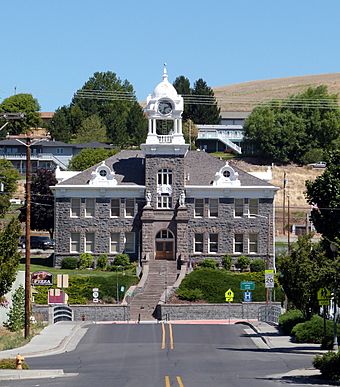Morrow County Courthouse (Oregon) facts for kids
Quick facts for kids |
|
|
Morrow County Courthouse
|
|

Exterior in 2012
|
|
| Location | 100 Court St., Heppner, Oregon |
|---|---|
| Area | Less than 1 acre (0.40 ha) |
| Built | 1902–03 |
| Built by | J. K. Carr |
| Architect | Edgar M. Lazarus |
| Architectural style | Eclectic American Renaissance |
| NRHP reference No. | 85000366 |
| Added to NRHP | February 28, 1985 |
The Morrow County Courthouse is an important building in Heppner, Oregon, a town in the U.S. state of Oregon. It was built over 120 years ago, between 1902 and 1903. This historic building was added to the National Register of Historic Places in 1985. Being on this list means it's a special place worth protecting because of its history and design.
The famous architect Edgar M. Lazarus helped design this courthouse. It was one of his first big projects.
Contents
What Makes the Courthouse Special?
The Morrow County Courthouse stands out because of how it was built and what it's made of. It's a two-story building that replaced an older wooden courthouse.
Building Materials and Design
The courthouse is built from strong, dark blue rock called basalt. This basalt was dug up right there in Morrow County! Lighter colored stone was also used for decoration. This lighter stone came from quarries near Elgin and Baker.
The building has a special kind of roof called a hip roof. It also has a main entrance area that sticks out a bit. Look up, and you'll see a cool dome on top, called a cupola. This dome has clock faces on three sides, so people can tell the time from different directions.
Surviving the Great Flood
The Morrow County Courthouse has a remarkable story about how it survived a terrible natural disaster.
The 1903 Heppner Flood
In 1903, just after the courthouse was finished, a huge flash flood hit Heppner. This flood was caused by Willow Creek, which flows through the town. The flood destroyed much of Heppner and sadly, many people lost their lives.
However, the courthouse was saved! It was built on higher ground, a bit above the rest of the city. This higher spot protected the building from the worst of the floodwaters. County officials had only just moved into the new building in March, and the flood happened in June. It was very lucky that the building was placed where it was.



